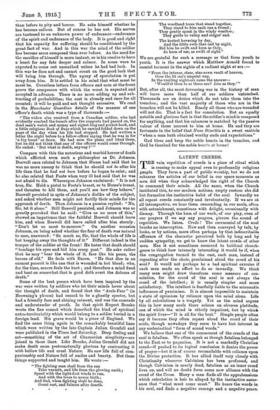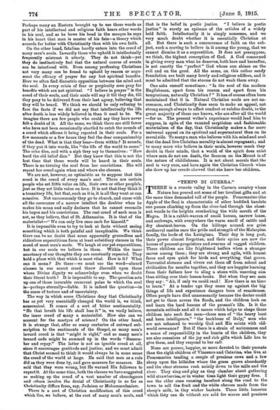LATENT CREEDS.
THE vain repetition of creeds is a piece of ritual which is ceasing to make appeal even to professedly religious people. They form a part of public worship, bat we do not rehearse the articles of our belief in our spare moments as men did when they acknowledged the right of the Church to command their minds. All the same, when the Church instituted this, to our modern notions, empty custom she did but formalize the instinctive habit of the soul. Inwardly we all repeat creeds constantly and involuntarily. If we are at all introspective, we hear them resounding in our souls, often with astonishment, sometimes with delight, occasionally with dismay. Through the hum of our work, of our play, even of our prayers if we say any prayers, pierces the sound of repetition. We listen. Credo! The ceremonial of the soul brooks no interruption. Now and then conveyed by talk, by looks, or by actions, more often perhaps by that indescribable effluence of the character perceived both by long and by sudden sympathy, we get to know the latent creeds of other men. Has it not sometimes occurred to habitual church-
goers to think how intensely interesting it would be if, when the congregation turned to the east, each man, instead of
repeating after the choir, proclaimed aloud the creed of his soul P It would not perhaps be a bad spiritual exercise if each man made an effort to do so inwardly. We think many men might draw therefrom some measure of con- solation, for the creed of the soul is not always the creed of the intellect; it is usually simpler and more satisfactory. The intellect is fearfully liable to the miasmatic influences of pessimism. It is almost impossible to maintain a state of optimism by reliance upon the mind alone. Life by all calculations is a tragedy. Yet as the mind argues this in how many souls there echoes an obverse platitude, one of which the mind is utterly impatient, but by which the spirit lives—" It is all for the beet." Simple people often any it because they often repeat aloud the creed of their souls, though nowadays they seem to have lost interest in any ecclesiastical "form of sound words."
We believe that one of the commonest of the creeds of the soul is fatalism, We often speak as though fatalism belonged to the East or to paganism. It is not a markedly Christian creed—if pushed to its logical conclusion it denies the power of prayer—but it is of course reconcilable with reliance upon the Divine protection. It has allied itself very closely with Christianity wherever Calvinism has been professed, and though Calvinism is nearly dead, fatalism as an inner creed lives on, and will no doubt form some new alliance with the creed of the Cross. Many a man finds all the apprehensions which calculation is heir to allayed by the instinctive assur- ance that "what must come must." He hears the words in his soul, and finds a negative courage and a negative peace. Perhaps many an Eastern brought up to use those words as part of his intellectual and religions faith hears other words in his soul, and as he bows his head in the mosque he says in his heart that man is master of his fate—a theory which accords far better with Christianity than with his own faith.
On the other hand, fatalism hardly enters into the creed of ninny men's souls. Inwardly those who uphold it intellectually frequently mistrust it utterly. They do not think—yet they do instinctively feel that the natural course of events can be interfered with. Even among professing Christians not very many can be found to uphold by reason or argu- ment the efficacy of prayer for any but spiritual benefits. Here we often find diametric opposition between the mind and the soul. In every crisis of fear or perplexity men pray for benefits which are not spiriteal "I believe in prayer" is the creed of their souls, and their souls will say it till they die, till they pray to be delivered from their last agony, believing that they will be heard. We think we should be only refusing to face the facts if we did not say that intellectually the life after death is less widely believed in than it used to be. We imagine there are few people who could say they have never felt a doubt of it. All the same, we think there are still fewer who have not been occasionally startled to catch the sounds of a creed which affirms it being repeated in their souls. For a few moments or a few hours they feel the dear companionship of the dead. What is that they hear—from within P It sounds, if they put it into words, like "the life of the world to come." The echo dies, and with a sigh they say to themselves "How hard the old belief dies." But they know that this is not the last time that those words will be heard in their souk There is no turning the soul from her convictions. She will repeat her creed again when and where she chooses.
We are not, however, so optimistic as to suppose that this creed is the creed of every man's soul. There are certain people who set little value on life, their own or other people's, just as they set little value on love. It is not that they think it a transitory life, but that, such as it is, it is all they want or can conceive. Not uncommonly they go to church, and curse with all the assurance of a narrow intellect the doubter when he makes his moan and sadly declares that he cannot reconcile Iris hopes and his convictions. The real creed of such men is not, as they believe, that of St. Athanasius. It is that of the materialist—" We can only live once each for himself.'
It is impossible even to try to look at facts without seeing something which is both painful and inexplicable. We think there can be no doubt that some apparently groundless and ridiculous superstitions form at least subsidiary clauses in the creed of most men's souls. We laugh at our pet superstitions, bat in our souls we believe in them. Within the inner eanctuaa7 of OUT thoughts they are constantly repeated. They hold a place with that which is most vital. How is it P What can it mean ? Do these—we must use the word—absurd clauses in our secret creed throw discredit upon those whose Divine dignity we acknowledge even when we doubt their literal truth? It is impossible to say. The question sets up one of those incurable recurrent pains to which the soul is—perhaps eternally—liable. It is indeed the question—in the sense of torture and of uncertainty.
The way in which some Christians deny that Christianity las as yet very essentially changed the world is, we think, nonsensical. it comes of a sort of bitter sentimentality. "He that loveth his life shall lose it " ie, we verily believe, the inner creed of many a materialist. How else can we account for the martyrs of science P On the other hand, it is strange that, after so many centuries of outward sub- scription to the sentiments of the Gospel, so many men's inward creed is that " might is right," and so many men's inward code might be summed up in the words "Remem- ber and repay." The latter is not an ignoble creed at all, since it encourages gratitude and justice; and we must admit that Christ seemed to think it would always be in come sense the creed of the world at large. He said that men as a rule did se they were done by, and gave measure for measure. Es said that they were wrong, but He warned His followers to expect it. At the same time, both the clauses we have suggested as making up the creed of a vast number of churchgoers and others involve the denial of Christianity in so far as Chrietianity differs from, say, judaisut or Mohammedanism.
There is a sort of Christian modification, a this creed which lies, we believe, at the root of many men's souls, and
that is the belief in poetic justice. "I believe in poetic justice" is surely an epitome of the articles of a widely held faith. Intellectually it is simply nonsense, and we very much doubt whether it is essentially Christian at all. But there is such a concurrence of faith. on the sub- ject, such a craving to believe in it among the young, that we cannot dismiss it as a superstition. It does not presuppose, we think, the highest conception of God. A God concerned in giving every man what he deserves, both here and hereafter, is not exactly the "perfect" God whose sun shines on the evil and on the good. All the same, on this rather sandy foundation are built many lovely and religious edifices, and it must be admitted that the storms do not wash them away.
One asks oneself sometimes : "Is the soul of the. modern Englishman, apart from his reason and apart from his temptations, naturally Christian I" It haa of course often been maintained that it is. Natural Christian souls are not un- common, and Christianity does seem to make an appeal, not strong enough always to affect conduct or subdue doubts to the great majority of those one knows, who are after all the world —for us. The present writer's experience would, lead. him to suppose, in spite of the vaunted scepticism and. fashionable materialism of the day, that Christianity makes a far more universal appeal on its spiritual and supernatural than on its moral side. To many a man who believes with his mindand soul that the dead live Christian morality is almost repugnant and to many more who believe in their souls, however much they doubt in their minds, that a world. of the spirit does exist where men do not see death, the Sermon an the Mount is of the nature of childishness. It is not about morals that the soul ia very sum and here again the Christian Church when she drew up her creeds showed that she knew her children..



































 Previous page
Previous page